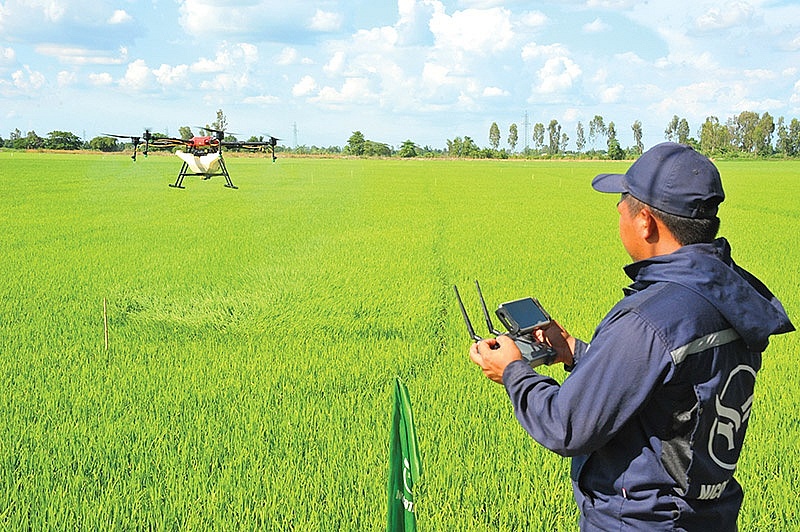Localities focus on digital overhaul to boost trade
 |
| Yen Bai is one province that wants to boost the digital economy in its agriculture sector. Photo: Le Toan |
In late June, Long An People’s Committee and Viettel jointly launched a 5G service there, marking a new important milestone in the Mekong Delta province’s digital transformation journey.
Nguyen Ba Luan, director of Long An Department of Information and Communications, said that the province promulgated Resolution No.21-NQ/TW dated August 2021 regarding digital transformation by 2025, with a vision towards 2030. Two months later, it issued an action programme to implement the resolution.
Luan added that the launch of the 5G service is among the steps toward Long An’s digital transformation, enabling it to develop into a smart locality, thus comprehensively changing the management and operation of the local authorities, increasing its efficiency; to develop a digital economy toward sustainability; and improving people’s living conditions in a modern, safe, civilised, and prosperous manner. Long An is the 20th province in the country to get 5G coverage.
Earlier this year, the Ministry of Information and Communications (MIC) stated that it considers this year a key one in terms of general efforts towards digital transformation across all localities nationwide.
At a meeting with Minister of Information and Communications Nguyen Manh Hung on his trip to the northern province of Ninh Binh in mid-June, provincial Party Committee Secretary Nguyen Thi Thu Ha said that in 2021 and 2022, the province has been spending VND150 billion ($6.5 million) from the state budget on digital transformation, triple that in 2020, aiming to boost IT application and developing an e-government.
Likewise, Tuyen Quang People’s Committee on June 24 enacted a set of indicators to assess and rate the digital transformation level of local state agencies, showing the northern province’s strong determination to implement the National Digital Transformation Programme by 2025; the E-government Development Strategy towards Digital Government in 2021-2025; and the National Digital Economy and Society Development Strategy by 2025.
In another case, Hanoi has also enacted a plan on post and telecommunications infrastructure development to serve the city’s digital transformation programme by 2025, with the aim to increase 5G coverage to all industrial zones, schools, hospitals, and tourist sites by the end of the decade. In terms of telecommunications infrastructure, Hanoi will develop broadband telecommunications infrastructure with 5G network and fixed broadband as the foundation for the development of a digital economy and digital society.
In the northern province of Yen Bai, the departments of information and communications; agriculture and rural development; and other relevant agencies in early June gathered to boost e-commerce for agro products, and develop the digital economy for the agriculture sector this year.
The province trades nearly 130 agro-products on e-commerce platforms. By the end of 2022 it aims to bring 100 per cent of agro-products recognised with 3-star certificates or higher to e-commerce platforms; and all agro-producing households trading on e-commerce platforms will be trained with digital skills, thus increasing e-commerce transactions and value.
Nguyen Dinh Chien, deputy director of the provincial Department of Industry and Trade, said that the province is digitalising agricultural production household data; providing e-commerce training programmes; and building platforms and encouraging agricultural production households to access digital platforms.
Similarly, the provinces of Son La, Hung Yen, Binh Dinh, Can Tho, Bac Kan, Bac Giang, and Ha Giang, which all have speciality agricultural products, early this year announced plans to promote the trading of agriculture products on e-commerce platforms as part of their efforts to develop the digital economy.
Digital transformation has been prioritised across most sectors, impacting ICT infrastructure, cybersecurity, e-government, digital skills, Industry 4.0, and tax policies. Major industries driving the growth of Vietnam’s digital economy include e-commerce, fintech, ICT, and edtech, among others.
What the stars mean:
★ Poor ★ ★ Promising ★★★ Good ★★★★ Very good ★★★★★ Exceptional
Themes: Digital Transformation
- Dassault Systèmes and Nvidia to build platform powering virtual twins
- Sci-tech sector sees January revenue growth of 23 per cent
- Advanced semiconductor testing and packaging plant to become operational in 2027
- BIM and ISO 19650 seen as key to improving project efficiency
- Viettel starts construction of semiconductor chip production plant
Related Contents
Latest News
More News
- NAB Innovation Centre underscores Vietnam’s appeal for tech investment (January 30, 2026 | 11:16)
- Vietnam moves towards market-based fuel management with E10 rollout (January 30, 2026 | 11:10)
- Vietnam startup funding enters a period of capital reset (January 30, 2026 | 11:06)
- Vietnam strengthens public debt management with World Bank and IMF (January 30, 2026 | 11:00)
- PM inspects APEC 2027 project progress in An Giang province (January 29, 2026 | 09:00)
- Vietnam among the world’s top 15 trading nations (January 28, 2026 | 17:12)
- Vietnam accelerates preparations for arbitration centre linked to new financial hub (January 28, 2026 | 17:09)
- Vietnam's IPO market on recovery trajectory (January 28, 2026 | 17:04)
- Digital economy takes centre stage in Vietnam’s new growth model (January 28, 2026 | 11:43)
- EU Council president to visit Vietnam amid partnership upgrade (January 28, 2026 | 11:00)

 Tag:
Tag:




















 Mobile Version
Mobile Version